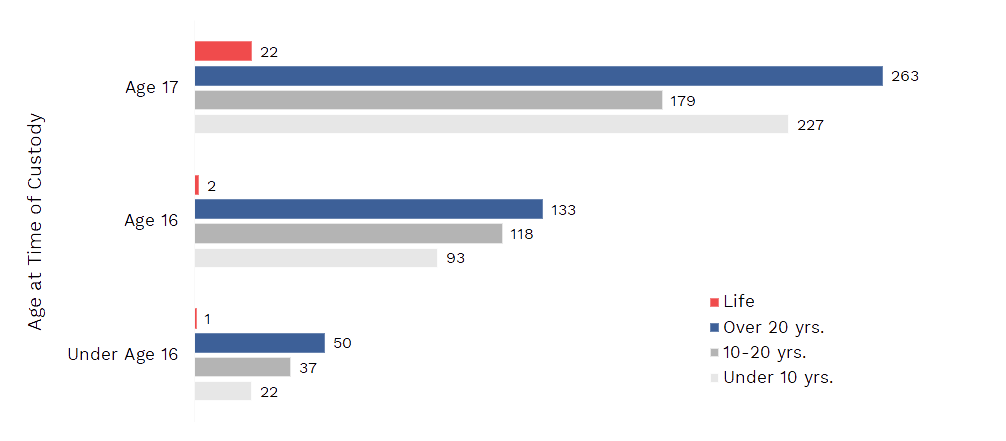What is automatic transfer?
Today, children as young as 16 may be automatically transferred to adult court if they are charged with certain offenses. Once in adult court, they face more punitive sentencing conventions and no longer benefit from consideration under a juvenile system that aims to provide age-appropriate, reintegration-focused treatment. This process is also known as statutory exclusion, named for the fact that some offenses are excluded by statute from prosecution in juvenile court.
In Illinois, transfer is triggered by prosecutors, who decide charging offenses. Once charged, juveniles have no legal mechanism to prevent or contest their transfer. Not only that, even if found ultimately exonerated of all charges, juveniles can never return to the juvenile justice system once transferred and sometimes even receive adult sentences for reduced charges that would not have been grounds for transfer.
Today, three offenses trigger the automatic transfer of 16- and 17-year-olds to adult court. These are:
- First-degree murder
- Aggravated criminal sexual assault
- Aggravated battery with a firearm
Until changes to transfer laws in 2015, children even younger than 16 were also eligible for automatic transfer, and for a broader array of offenses (including home invasion, armed robbery, and aggravated vehicular hijacking).
As of June 2017, roughly eleven hundred people in Illinois prisons were serving sentences for offenses committed as children. More than 4 in 10 of these individuals are serving sentences longer than 20 years. Figure 1 breaks down the distribution of these sentences by age at offense.
Figure 1. Sentence lengths to individuals serving prison terms in Illinois for offenses committed as children

Caption. Data were sourced from IDOC’s public report on prison population as of June 30, 2017.
Why does it matter?
Automatic transfer laws run counter to the judicial idea—enshrined in multiple court decisions—that children are fundamentally distinct from adults and must be treated differently by our legal systems.
Current transfer laws in Illinois also place disproportionate power in the hands of prosecutors, who by the nature of their position are more incentivized to take a combative stance against defendants. In many other states, transferring children to adult court requires a deliberate decision to do so by either the court or prosecutors (in these states, prosecutors must choose to file their cases in adult court rather than letting the nature of the charging offense trigger automatic transfer).
While not a perfect system, that these states require this extra step means courts and prosecutors must at very least recognize that putting a child in an adult courtroom is a choice and not just “the way things are.”
Finally, while transfer is “automatic,” it is far from impartial. A report from the Juvenile Justice Initiative found that of 257 children automatically transferred to adult court in Illinois between 2010 and 2012, over 80% were black. Only one was white.
Given the prominent record of how race and racism color the conduct of Chicago police and court systems, it shouldn’t be hard to see why giving prosecutors the full power to control transfer decisions might contribute to racial disparities.
Want to learn more?
For the clear and cogent analysis of automatic transfer laws in Illinois today, there is no better source than the Juvenile Justice Initiative; while based on data from before the 2015 law change, their 2014 report remains required reading. The National Conference of State Legislatures (NCSL) also has an excellent overview.
Linked Sources
Bosman, J., & Smith, M. (2017, January 13). Chicago police routinely trampled on civil rights, Justice Dept. says. The New York Times. Retrieved from https://www.nytimes.com.
Illinois General Assembly. Bill Status of HB3718, 99th General Assembly. Retrieved from: http://www.ilga.gov.
Ishida, K., Clarke, E. & Reed, D. (2014). “Automatic Adult Prosecution of Children in Cook County, Illinois. 2010-2012.” Chicago, IL. Retrieved from http://jjustice.org/wordpress/wp-content/uploads/Automatic-Adult-Prosecution-of-Children-in-Cook-County-IL.pdf
Teigen, A. (2017, April 4). Juvenile Age of Jurisdiction and Transfer to Adult Court Laws. Retrieved from http://www.ncsl.org/research/civil-and-criminal-justice/juvenile-age-of-jurisdiction-and-transfer-to-adult-court-laws.aspx
Warden, R. (2016, April 27). ‘Crook County’ investigates racism in Cook County criminal court system. The Chicago Tribune. Retrieved from http://www.chicagotribune.com.

